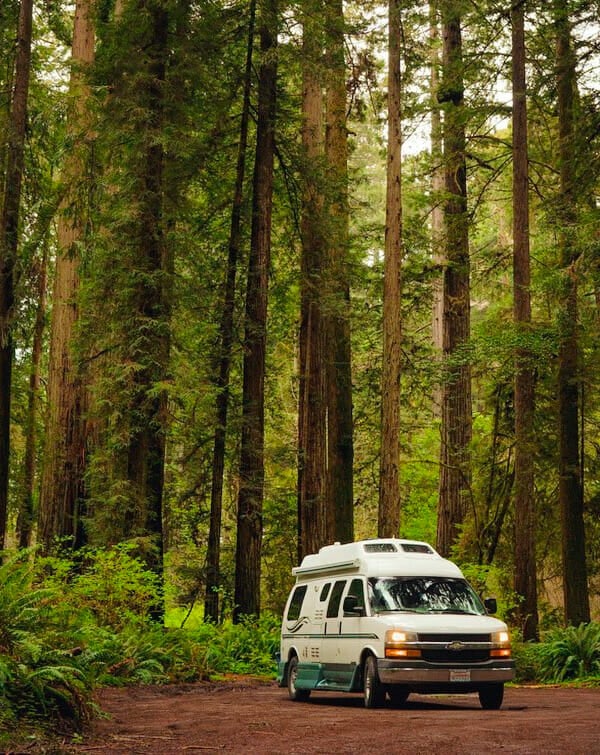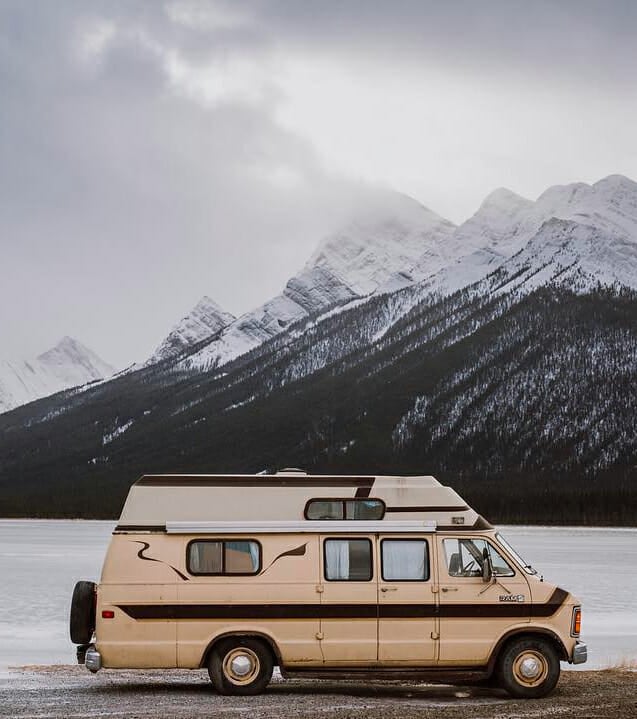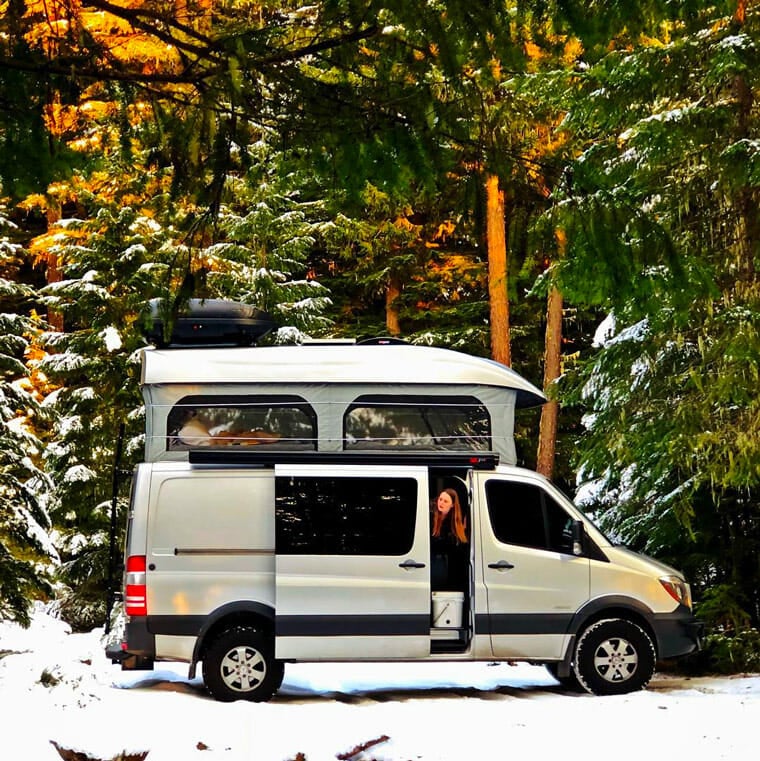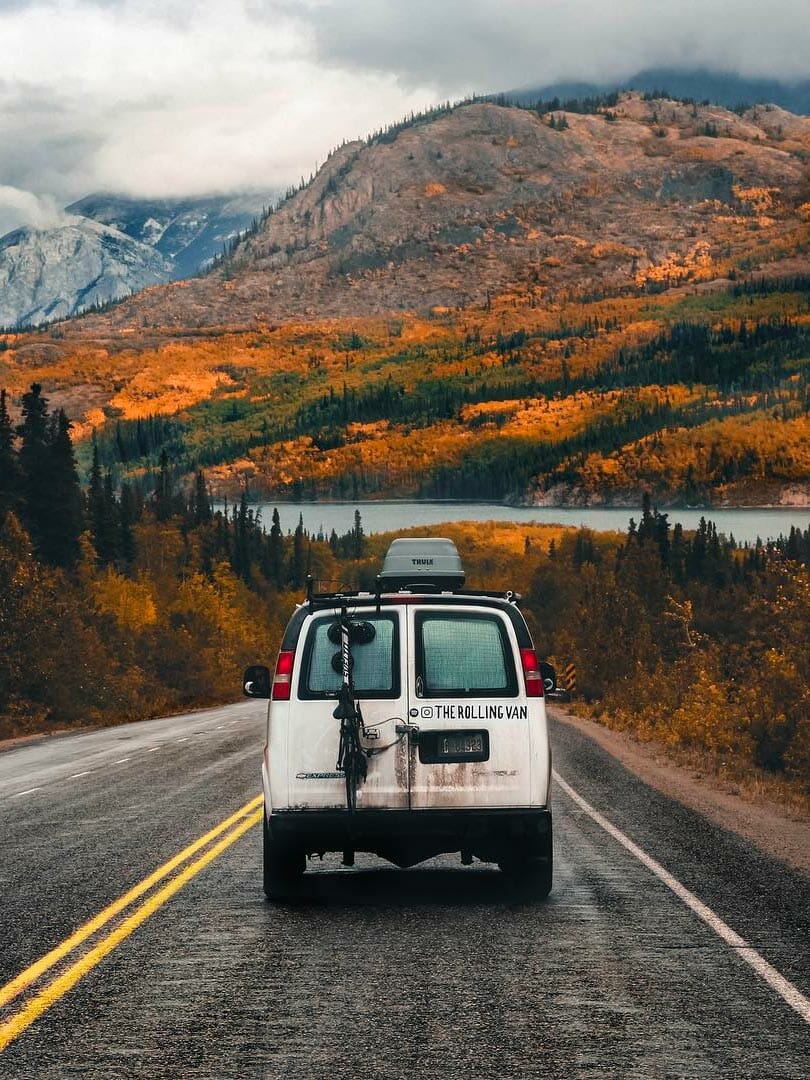How To Buy A Used Camper Van
Read our post on the best van to live in. Once you have a general idea of what van you want to buy, it’s time to start hunting! First, let’s start with some general tips, then go onto how to inspect a campervan to live in.

General Tips When Choosing A Van
Mindset!
Your mindset when buying a van is as important as any other part of the project. At each step, it’s good to step back and take a look at your overall goals and the big picture.
Don’t get to attached to a specific vehicle. As humans, once we focus all of our attention on one thing it starts to control our thoughts and influence our reality. There is a chance of letting “the one” get away by not acting soon enough, but when you’re beginning your search it’s more likely that you’ll jump in too quickly.
Also, when looking at used vehicles from private sellers, realize that part of the process is flaky interactions and occasional people lying through their teeth.
I’m a believer that most people are good people but that doesn’t mean that you shouldn’t protect yourself from people trying to pull a fast one over you.
The biggest thing is to not get discouraged if someone doesn’t respond do a question or can’t meet up with you. If you’re getting over a 25% response rate, you’re doing better than I usually do in the used market!
Mileage – How many miles is too many?
This question has too much emphasis in my opinion! Mileage is important, but condition is more important. A well maintained vehicle at 200K miles will treat you better than 100K miles driven hard and uncared for. Unless your vehicle has specific things that tend to break down a higher mileage, then follow all of the standard inspecting procedures.
All that being said, anything up to 200K is worth looking at. Older vehicles will generally need more maintenance but often it is piecewise – a fuel pump here, some wheel bearings there, etc. – so if you budget properly these aren’t surprises and can keep you on the road fairly reliably.
If you’re mechanically inclined you can push that number and if you don’t want to deal with maintenance go for a certified-used option from a dealership.
Budget
When buying a used vehicle we don’t usually like the idea of financing. It seems that unless you have special circumstances where you can make a decent amount of money on the road but need to leave quickly then it makes more sense to save up properly with an emergency fund before committing to the lifestyle.
If you’re thinking of financing, you’re likely setting your goals too high. Leasing is even worse because you shouldn’t be making heavy modifications to a vehicle you don’t own.
When looking at vans for a diy conversion, consider an emergency fund as part of the budget. There are varying schools of thought on this, but it’s important to have a backup fund because when you’re on the road, if something breaks you’re out of your home!
I like to price out a full motor swap to get a general idea of what kind of backup cash the particular vehicle will need. For our Dodge 1500, this is around $2k-$3. This is different for a Mercedes Sprinter which is closer to $15K.
Newer vehicles break too, so just because you have a newer one doesn’t mean you shouldn’t have cash for emergency repairs.

Vehicle Age
When looking at how old of a van you can get, there are a couple of things to consider. Newer vehicles are generally safer all around. Better crumple zones, more air bags, safer breaking systems.
- Any vehicle in the US sold from 1996 and newer will have OBD II, which makes diagnostics easier.
- Old vehicles are easier to work on but break more and generally have more frequent maintenance intervals. If you’re handy, grab a service manual and read up to make sure you keep on top of the preventative manintenance.
- In some particular cases, newer vans have their own issues.
Rust
This is such a headache that it gets its own category. Body rust can be a headache when dealing with a build. Cleaning up rust is always harder and takes more time than you imagine.
Rust also makes maintenance harder. Hoping you don’t snap off a bolt when changing your shocks is an extra level of hassle that you usually don’t envision when buying a rusty van. Be very wary of rusty vans as it is an issue that you can’t turn back the clock on.
Vehicle specific issues
When you decide on a vehicle or one catches your eye, it’s good to do some internet research for particular issues with that vehicle model and year. Look at what things are saying in forums and how difficult those problems are to address.
For instance, the motors in a 1996 Ford are amazing, but in 1997 they switched to the Triton motor which had a tendency to blow out spark plugs.
Re-sale value
Should you consider re-sale price in financing your build? In our opinion, any money you plan on making on top of the conversion should be considered fluff and not relied on as part of the process.
For those who only want live the van life for a year or two, we like to think of the van as a cheap extended vacation cost. For those who want to live permanently, selling the van should be low on your list of priorities.

Vehicle inspection
This is understandably intimidating, especially if you haven’t bought from a private party before! Remember, at any part of the process if you feel uncomfortable, it’s completely acceptable to back out and start over with different vehicle.
Self-Inspection
Every vehicle that you buy you should test drive. This is not only to see if you have any problems with the vehicle but if you like driving it in general!
Some combos of vans and people don’t mix well, so it’s good to get acquainted with your potential home.
Try to arrange a meetup in a way that you can hear the van start up cold as this can reveal issues that don’t show once it’s warmed up.
Chris Fix has a great .pdf checklist and video series for a visual inspection and test drive of a vehicle that I really like.
Don’t be afraid to bring a mechanically inclined friend to look at it with you as well as help you stay more rational about the decision.
If you’re particularly uncomfortable meeting strangers, you can arrange to meet at a public location (call your local police station as they often have a spot specifically for these types of transactions).
Mechanic Inspection
This is a toss up, but most honest people trying to sell their vehicle will allow you to have it inspected by a professional mechanic. Some are hesitant, but if you leave your vehicle with them it generally is more of a comfort.
Arrange this before hand with your mechanic and the seller. Usually a 1-hour inspection will cost you between $50-$100, which is a small price to pay if it saves you from a $1800 repair.
A vehicle inspection also gives you the opportunity to haggle the price down if you still want the vehicle. Many times the owner doesn’t realize that they have important maintenance to do and will gladly reduce the price to get it out of their hands.
Often these things are intimidating or will cause headaches, so if you’re feeling a bit intimidated a dealer will cut out many of them. You will be paying a premium in price and your options are sometimes limited this way.

Bonus Craigslist Tips:
- Try separate searches of multiple iterations of vans to get what you want. Many times someone will list a van as a Ford Van, which won’t show up if you are searching for Econoline or E-150. Try things like, “Cargo Van, Conversion Van, Camper Van, Campervan, Class B”, etc.
- Some sellers are downright terrible at clearly listing what they have. Remember to look at the RV section as many partial builds are listed there
- Don’t use too many filters as people either unintentionally or intentionally mis-represent what they have quite often.
- Use searchtempest.com to search multiple craigslist areas at once. This is particularly useful if you’re looking for something rare that you’re willing do travel a ways for.

Thanks for all of the great tips. I learned quite a bit. Plan on buying my first RV this January and pretty much got stuck on the idea of a Rialta.
I enjoyed reading the article. I’m in need of a van to live in. I know that van lifers sometimes sell their vans and then rebuild another one. Where do the van lifers sell their vans?
I think buying a 25 year old van is sort of a tossup. We bought a brand new van because it was 25% off MSRP and had 98% of what we wanted.
That being said we are financing it and we are ahead of schedule on the payments but I think of other people who are paying tons in maintenance costs because of the age and mileage of their vans.
Perhaps I would wait another 6-9 months if I would do it over again just to have more options.
Great posts!
Aaron-
I’m glad you took the time out to comment! Each situation is different, so we agree that a 25 year old van is a bit of a risk for certain situations and people. And with the caveat that buying a vehicle to live in is different than buying one to travel in, I’m the kind of person who thinks that the majority of people shouldn’t be buying a new vehicle. It’s so common that I hesitate to really emphasize how much I think it’s a waste of money because it’s sure to offend, but I think everyone would benefit from sitting down and running the actual numbers. I think most people would be surprised that even getting 25% off MSRP is still much more expensive than getting a used vehicle.
And living in something that the bank owns is also counter to my personal views as it can render you homeless quickly and then you’re even worse off. Some people really have no choice and are living in a van out of necessity. But if you don’t have a choice, you should be buying as cheap of a used vehicle that you can and travel as few of miles as possible to reduce costs. If the point of vanlife is to get you out of financial hardship, this will happen much quicker with a vehicle that you own. If your goal of vanlife is to enjoy exploring on the road, then financing a vehicle means that you cannot afford it yet. In my opinion you should save up until you can afford it or buy something cheaper. It’s also nicer mentally knowing that if your van is totaled or stolen, you haven’t lost everything you own (or if the bank owns the vehicle- more than everything you own. You’ll also be paying higher insurance and such with a financed vehicle.
Let me use our van as an anecdote because it’s good for exploring the points: Our 1996 Dodge van costs us $3400 and took another $2K in parts to get it up and humming along with new suspension and such. The entire van build was about $8K, but the base vehicle was $5,400. It costs us $600/year to insure it and about $500/mo in gas to travel all over! Over the course of two years, we have averaged about $200/mo in repairs and maintenance (some $600 months and some $0 months).
Now, if we were to do the exact same thing with a new Promaster or Transit, the initial cost would be close to $38K for the base van. We’ll use your numbers of 25% off and say got lucky with $29K out the door. Using a 4.5% APR 48 month loan and a $5,500 down payment (the cost of our base van with repairs), you’d be paying $590/month for the van. Insurance with comprehensive will be more expensive; it’s about $1300 for a year from what I’m seeing. Driving the same distance it looks like gas costs will be about $150 less per month if you can manage 20mpg compared to our 16mpg. So… with those numbers you’ll be paying about $290 more every month for 48 months if everything else is equal. Those are conservative numbers as well because I’m not factoring in maintenance costs on the Transit/Promaster- things like oil changes- especially because you’ll likely be doing so at a dealer to keep the warranty. It’s also not counting the fact that the transit repairs will be much higher once the warranty runs out. I’m not even counting taxes and including a sizable downpayment. So, back to the simple math, That’s about an extra $13000 for a two year sting in the van. At a $5,500 base cost, I could wreck or lose my entire van twice over and still be paying less than if I bought a new van (three vans total). Repair costs are a valid concern, but even factoring that I’m still making $290 a month. And that’s driving about 2600 miles a month which is a lot!
If you’re driving fewer miles than us, the difference becomes greater because repair costs and gas costs go down, making the benefits of a new vehicle not as significant. And you’d have to consider that the cost of a new vehicle with tax and options is probably above 29K, I just wanted to make sure that I’m giving as much benefit of the doubt to a new vehicle. More people are financing at 60 and 72 month terms as well, which also makes the numbers more in favor of buying used as you’ll be paying more with interest and you won’t own your vehicle until 3 or 4 years in. It’s not very difficult for a bank to reposes a car if anything were to go wrong on the payments.
Now, this doesn’t account for a few factors: resale of a newer built out camper van is sometimes quite lucrative if you find the right buyer. It’s a niche market, so this can’t be guaranteed, but it is definitely a consideration. But this is also the case with a cheaper vehicle, so it comes out as a wash a bit in that department. The point is that for people planning on a year or two adventure in a van, financing a vehicle is usually losing money. This is all opinion, of course, but I rarely see the numbers work out, no matter how good of a deal you end up getting at a dealership. With that said, I’m glad you’ve got a van and hope the best in your adventures on the road!
Amazing! Thanks for crunching the numbers. I was debating the exact same thing between a newer (not new and definitely not financing it) or older car to do up. You’ve convinced me to go back to an older model as I won’t be moving that much.
Nice useful and informative site.
I bought a 1992 Roadtrek 190 Versatile. I prefer the versatile as I like the layout and the way it is designed.
It was purchased for $3500.00 and was in fairly rough shape. It is a basic Roadtrek. There is no hot water tank which means simplified plumbing and very quick (10 minutes) to winterize.
Engine is a 5.2Liter (318 cubic inch) and it runs excellent.
A new transmission was installed. $3500.00
A coach battery was installed. $150.00
A house battery was installed. $150.00
New rear brake drums and pads. $200.00
New alternator 90 amp. $200.00
Front rotors, calipers, brake pads. $600.00
Fantastic Fan. $250.00
Miscellaneous items. 1500.00
===========================
Total invested in van to date. 10,050.00 Canadian.
We purchased the van with 98,000 kilometers and put on 90,000 kilometers over 2.5 years.
We have slept in the van 124 nights.
My math and thought process on this is as follows. Every night we sleep in the van, we save $100.00 by not staying in a hotel. A campground is generally $30.00 per night and a hotel is $129.00 per night. (super 8, comfort inn type hotel).
So, by staying 124 nights in a hotel we save $12,400.00 versus the cost of $10,050.00 to date.
We do not count gas since my other vehicle is a pickup with a heavy contractor cap. Gas savings are minimal.
We do not count food costs since we have to eat. In the van or restaurant it makes no difference to us.
What the van has allowed us to do is to have holidays we would not normally have. Extended month long vacations are made more enjoyable. Because it is an older van, if it dies on us, we can simply walk away from it if we choose to. So far all repairs have been doable.
Upcoming expenses will be to integrate Solar and LifePo4 batteries in the system with a 3000 watt invertor using the full 3000 watts into the shore power plug to run the AC via the battery. This will allow us to remove all the solar components without having altered the existing AC and DC in the van.
2 x 100 Watts solar panels initially with 1 LiFePo4 battery, MPPT and invertor to start off with.
We are doing it on the cheap and we go places others fear to tread.. Go ugly but go.
cheers
dan
I found a converted camper van that is still listed as a van as far as the DMV is concerned. I understand I can get it categorized as a RV when I but it for lower insurance and registration.
However, buying it is first….. how do I get financing for the worth of the whole converted van? It’s from a private seller. I have excellent credit.
TIA
My credit union will finance but only for vehicles 10 years or newer. You won’t be able to finance it as an RV until its categorized with the DMV that way.
Registering with the DMV as an RV will require it to meet your state’s rules as an RV. Like a house certain things are required.